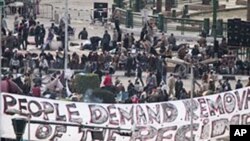Egypt has been a linchpin of America's strategy in the Middle East. One of the key worries, if President Hosni Mubarak's regime is toppled, is that a new government might be less friendly to Washington and break the country's 32-year-old peace treaty with Israel.
Egypt was the first country to make a historic peace treaty with Israel in 1979, but it is known here as "a cold peace." The two governments cooperate on security and some economic matters, but there is little warmth between the peoples.
In Egypt, portraying President Hosni Mubarak as a Jew is one of the worst insults imaginable. In recent days the Egyptian leader has appeared on some anti-government protesters placards with a Star of David painted on his forehead.
|
VOA's Jerome Socolovsky in Cairo's Tahrir Square, February 4, among protesters:
|
But most of the young anti-Mubarak protesters, like 20-year-old Nermine Essam, are focused on other matters.
"We have no problem with America. And with Israel, I don't know what is going to end up. But if [Mubarak] has no problem with the foreigners, he has a big problem with the Egyptian people. This is more than enough!" said Essam.
The political opposition has also been more inward looking.
George Ishaq of the Kefaya party says it is premature to make assumptions about any post-Mubarak policies.
"Don't make vision before our life, because our life is very disturbed," he said.
But there is a clear anti-Israeli and anti-American line in the opposition. The fundamentalist Muslim brotherhood often accuses Mr. Mubarak of favoring Israel and America's interests over those of the Egyptian people.
And even moderates like Ishaq are ambiguous when asked about the peace treaty with Israel.
"There are no agreements that stay 30 years without a change," said Ishaq.
And change is exactly what the pro-Mubarak protesters want to prevent.
This man says the regime has been a bulwark against radicalization.
"We see what happened in Iraq and other countries. We want reason to prevail," he said.
The opposition is made up of an old guard and the younger generation. And both seem to agree that there will be no major foreign policy change in a post-Mubarak Egypt - at least not before they have sorted out their their own problems.
Mubarak Timeline




